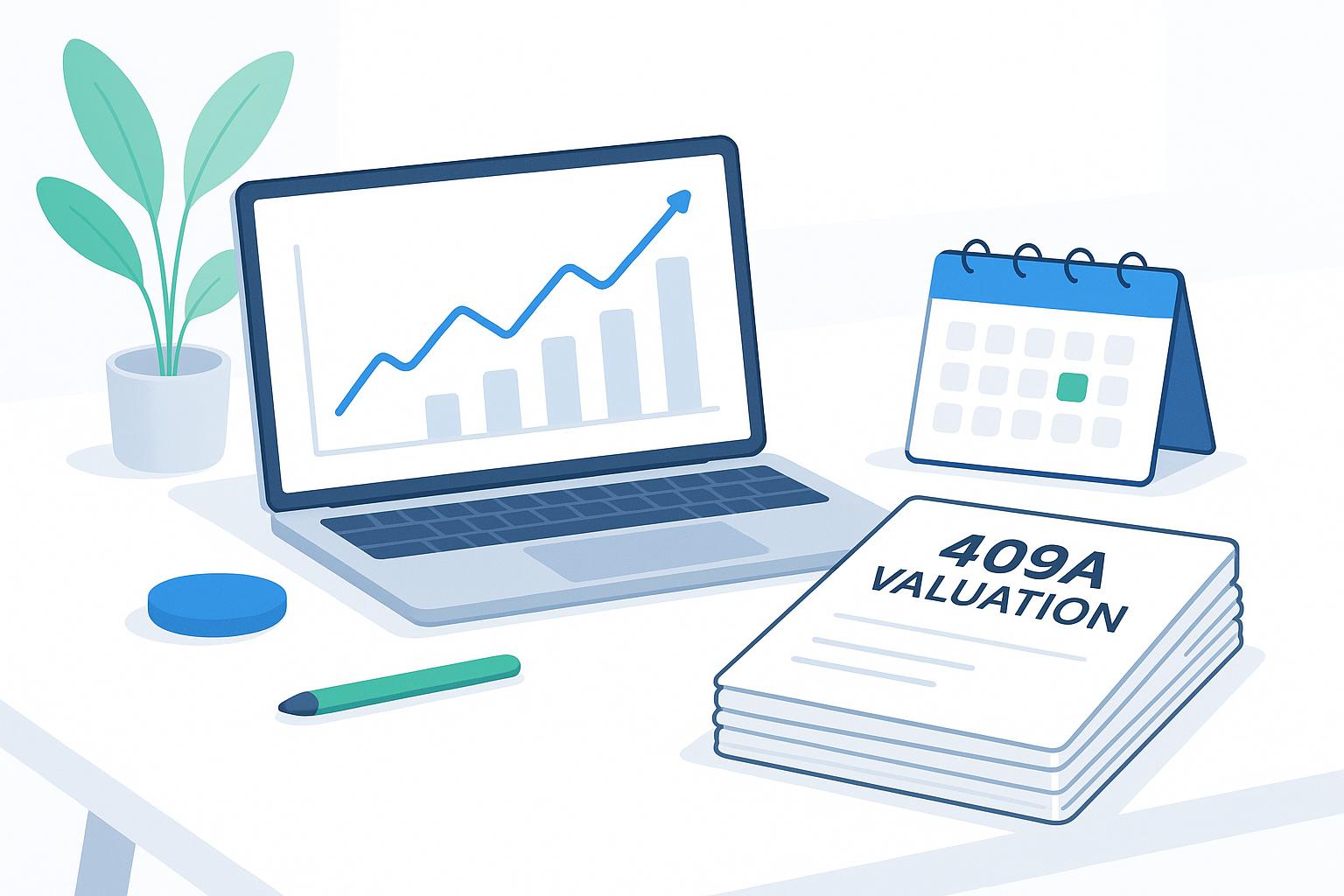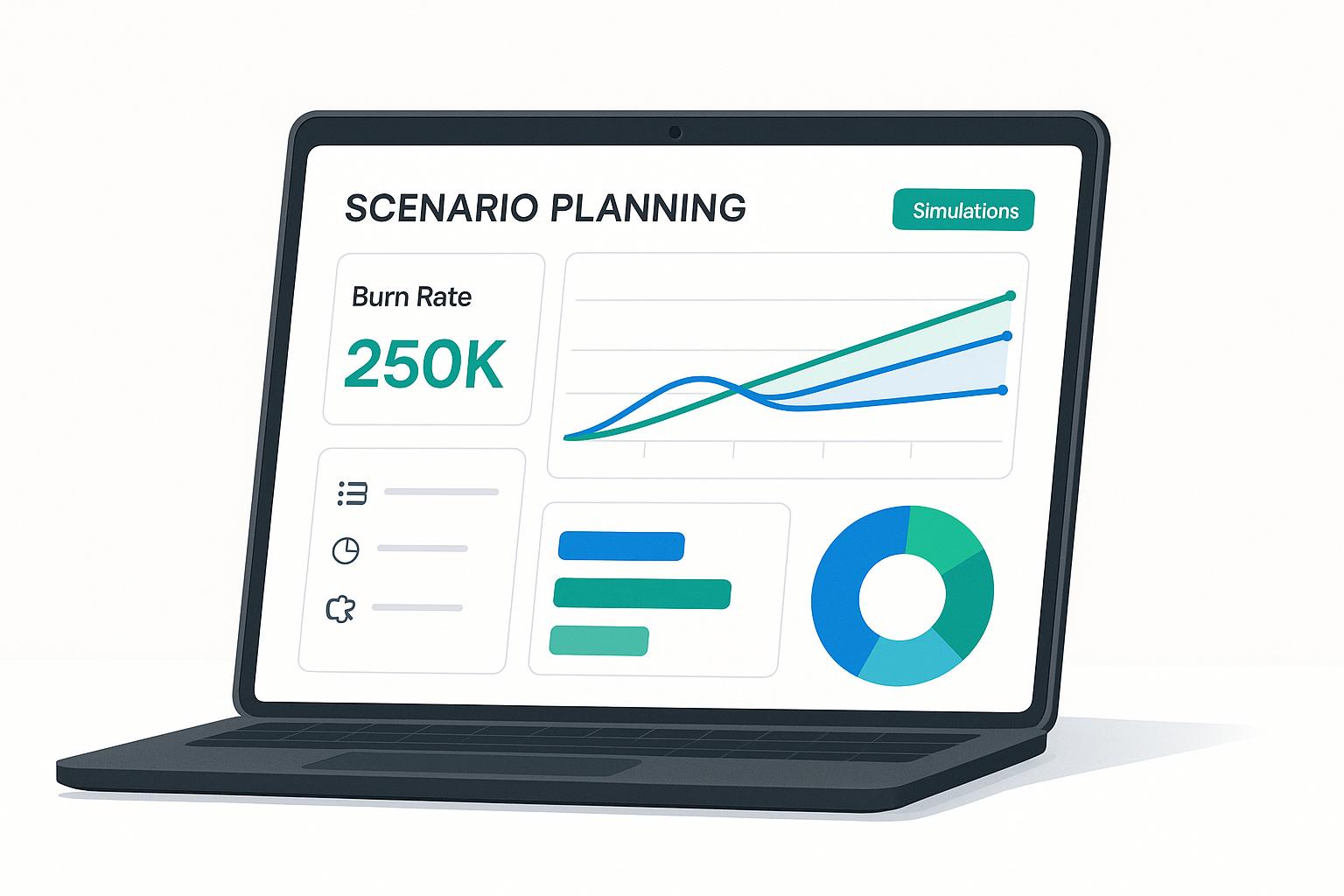AI-driven financial planning is changing how startups manage their finances. Here's what you need to know:
- Saves Time: Automates manual tasks like bookkeeping, forecasting, and compliance, saving up to 200 hours annually.
- Improves Accuracy: Reduces errors in financial reports, forecasting, and compliance processes.
- Boosts Growth: Provides real-time insights for better decision-making, from budgeting to investor presentations.
- Scales with Your Business: Adapts to business growth, offering advanced tools for both early-stage and growing startups.
- Case Studies: Companies like Prosperity Partners and SpendWise Solutions have seen outcomes like 40% higher client satisfaction and 30% asset growth using AI-powered tools.
AI financial tools integrate with platforms like Slack and accounting software, offering real-time data and scenario modeling. This helps startups stay financially prepared, make informed decisions, and build investor confidence. Keep reading to see how startups are leveraging AI for faster processes, better forecasts, and cost savings.
How AI Is Revolutionizing Finance for Startups
How AI Changes Financial Planning
For years, financial planning has relied on manual spreadsheets and outdated models that are both time-consuming and prone to error. AI is shaking up this traditional process by introducing tools like machine learning, natural language processing, and predictive analytics. These technologies create financial management systems that are dynamic and work in real time. Instead of spending hours updating spreadsheets or reconciling accounts, startups can now tap into instant financial insights and automated solutions tailored to their specific needs. This shift opens the door to advanced automation and seamless integration of real-time data.
Automation and Real-Time Data
AI takes over the repetitive, manual tasks that often bog down startup founders. With machine learning algorithms, transactions are automatically categorized, bank accounts reconciled, and unusual spending patterns flagged. But it doesn’t stop at bookkeeping - AI also handles compliance checks and risk assessments, cutting down on manual work and minimizing the risk of costly errors.
What makes this technology even more powerful is its ability to connect directly to various data sources like bank accounts, payment systems, and CRM tools. This constant flow of data gives startups an up-to-the-minute view of their cash flow, expenses, and revenue. Founders no longer have to rely on outdated monthly reports. Instead, they can spot budget issues early, monitor spending patterns as they happen, and make well-informed decisions without delay.
Take Lucid Financials, for example. Their platform simplifies financial management by delivering clean, reconciled records in just seven days while maintaining always-on reporting. Tasks like transaction matching and account reconciliation are handled automatically, freeing up founders to focus on growing their business instead of drowning in weekly financial chores.
AI-Powered Forecasting and Planning
AI doesn’t just automate processes - it also brings new levels of accuracy to financial forecasting. Traditional forecasting methods rely on static models that can quickly become irrelevant as conditions change. AI-powered forecasting, on the other hand, uses real-time data, seasonal trends, and external market factors to produce projections that are both precise and adaptable. This means startups can update their forecasts monthly - or even weekly - ensuring their financial plans stay aligned with actual performance.
Another game-changing feature is instant scenario modeling. Startups can test different "what-if" situations - like shifts in market demand or changes in interest rates - without having to manually redo their plans. This makes it easier to stress-test financial strategies and prepare for unexpected challenges.
As startups grow, AI systems become even smarter, learning from new data patterns to deliver deeper insights. For example, they might uncover connections between marketing spend and customer lifetime value or identify seasonal cash flow trends that might otherwise go unnoticed.
The precision of AI forecasting isn’t just valuable internally; it also strengthens investor relations. When startups present projections backed by AI-driven data, they demonstrate a clear ability to plan and adapt. Investors appreciate the reliability of these insights, which builds trust. Additionally, the real-time nature of AI forecasting means startups can quickly adjust their strategies and provide stakeholders with updated plans supported by solid data.
Integration with Startup Tools
AI financial platforms are designed to work effortlessly with the tools startups already use every day. This seamless integration eliminates the need for founders to switch between multiple systems. They can request financial reports, check cash flow, or get real-time updates - all without leaving their primary workspace.
For instance, a founder could ask about their current runway directly in Slack and receive an instant reply complete with supporting data. Need a board report? AI can generate and share it within minutes. This approach transforms financial management from a tedious, standalone task into something that fits naturally into daily operations.
Lucid Financials offers a great example of this integration. Their platform connects with Slack, enabling founders to access financial insights, generate investor reports, and even get CFO-level advice - all within their communication app.
Beyond communication tools, AI also integrates with accounting software, billing systems, and other essential business applications. By pulling data from multiple sources at once, these systems create a comprehensive financial snapshot that reflects all aspects of the business. This unified view allows for better planning and faster decision-making in response to changing conditions.
These advancements mark a shift from reactive financial management to proactive financial intelligence. Startups no longer have to wait for end-of-month reports to understand their financial health. With access to real-time data, they can run scenarios, adapt to challenges, and make smarter decisions - all in the moment. This approach not only saves time but also helps startups maximize their resources and improve their return on investment as they scale.
Case Studies: AI Financial Planning Results
Startups are already benefiting from AI-driven financial solutions, transforming tedious tasks into opportunities for strategic growth. Here's how AI is reshaping financial operations.
Faster Financial Processes
In 2025, Prosperity Partners implemented an AI-powered wealth management platform that utilized deep learning and reinforcement learning. The results were striking: client satisfaction scores jumped by 40%, and assets under management grew by 30% within two years. Before AI, their finance teams spent countless hours on manual tasks like data entry, reconciliation, and report generation. With AI-driven automation, they slashed manual bookkeeping time by 80% and reduced their monthly financial close process from several days to just a few hours.
| Process | Before AI | After AI | Improvement |
|---|---|---|---|
| Monthly Close Time | 5 days | 1 day | 80% reduction |
| Manual Data Entry | 40 hours/week | 8 hours/week | 80% time savings |
| Error Rate | 3–5% | <1% | 70% fewer errors |
| Staff Hours on Routine Tasks | 200 hours/year | 40 hours/year | 160 hours saved annually |
These efficiencies allowed teams to dedicate more time to strategic analysis and strengthening client relationships. The operational improvements also laid the groundwork for more advanced forecasting capabilities.
Better Forecasting for Investors
A SaaS startup revamped its financial forecasting by moving away from static spreadsheets to real-time, dynamic projections. By integrating AI with CRM and billing systems, they enabled automatic updates to revenue goals and hiring plans. This shift allowed the company to transition from annual forecasts to quarterly re-forecasts, showcasing AI's value in strategic decision-making. Similarly, SafeGuard Financial used AI-powered predictive systems to reduce false positives and cut down on manual reviews, leading to improved compliance and lower regulatory risks.
Finance teams leveraging AI for scenario modeling are now saving up to 200 hours annually while delivering adaptive projections that inspire greater confidence among investors.
Tax Savings and Compliance
AI's benefits extend beyond process optimization and forecasting to tax savings and compliance. SafeGuard Financial, for example, struggled with traditional rule-based compliance systems that generated excessive false positives, requiring time-consuming manual reviews. In 2025, they adopted AI-driven predictive compliance monitoring to overhaul their regulatory management approach. The system automatically scanned financial records to identify eligible tax credits, eliminating the need for manual quarterly reviews and reducing the risk of missed deadlines or opportunities.
The financial impact was notable. By uncovering overlooked R&D tax credits, the AI system not only reduced compliance costs but also generated thousands of dollars in additional savings. As Refael Shamir, Founder and CEO of Letos, remarked:
"With Lucid, managing bookkeeping, taxes, and claiming tax credits is effortless. The platform saves us hours every month, and their expert team makes sure nothing slips through the cracks."
Startups employing similar AI-based tax strategies have reported dramatic cost reductions and minimized compliance risks by automating complex tax scenarios.
These examples highlight how AI-driven financial planning can streamline operations and maximize returns. From cutting operational time by 80% to growing assets under management by 30%, the combination of intelligent automation and expert oversight ensures both efficiency and accuracy in critical financial processes.
sbb-itb-17e8ec9
Best Practices for AI Financial Planning
The examples shared earlier highlight some effective strategies for integrating AI into financial planning. Startups that adopt these methods often achieve quicker results and sidestep common challenges that can disrupt their financial processes.
Use Real-Time Data and Automation
Integrate your systems early. The most successful startups connect their AI financial tools with existing platforms like CRM systems, payroll software, and banking APIs. This creates a seamless flow of data that updates automatically, eliminating the need for manual input.
Take Quinn, for instance - an AI-driven wealth advisory platform that raised $11 million in seed funding in 2025. Quinn’s success stemmed from its focus on real-time data integration and automating repetitive tasks, which allowed the company to deliver high-quality recommendations while improving operational efficiency.
Automate time-consuming tasks. Start by automating processes like bookkeeping, reconciliation, and report generation. Platforms such as Lucid Financials help startups maintain accurate records within a week and provide investor-ready reports through automation.
Look for tools that update cash flow, expenses, and revenue forecasts in real time. These insights enable quick, informed decisions, and when paired with scenario planning, they take financial decision-making to the next level.
Use Scenario Planning for Decisions
Simulate different outcomes for key decisions. AI-powered scenario modeling allows startups to analyze multiple financial possibilities. Instead of static spreadsheets, companies can create best-case, worst-case, and likely scenarios for hiring, marketing budgets, and fundraising goals.
For example, banks use AI to stress-test portfolios against interest rate fluctuations, while SaaS companies adjust revenue targets and hiring strategies based on live customer data. This forward-thinking approach helps address risks before they escalate into major problems.
Develop detailed financial plans quickly. With tools like Lucid Financials, startups can craft fundraising strategies, make informed hiring decisions, and track burn rate and runway in real time. Instant scenario comparisons give startups the confidence to make critical business decisions.
By adopting AI for scenario modeling, finance teams can save up to 200 hours annually, compared to manual forecasting methods. While automation provides clarity, human oversight ensures these insights translate into effective strategies.
Combine AI with Expert Review
Don’t rely solely on AI for critical decisions. While AI delivers fast, data-driven insights, human expertise is essential for ensuring compliance, accuracy, and context. The most effective systems combine AI automation with expert validation.
Conquest, supported by Goldman Sachs and Citi, equips over 60,000 advisors with AI-driven tools while retaining human involvement for complex decisions. Citi has invested $12 billion in technology to implement this hybrid model across its global operations.
Establish clear review protocols. Choose platforms that integrate expert feedback directly into the workflow. Many successful startups use tools like Slack to enable real-time expert reviews of AI-generated financial data, ensuring all insights are thoroughly vetted before influencing major decisions.
Aviv Farhi, Founder and CEO of Showcase, sums it up perfectly:
"Lucid turned our bookkeeping and taxes from a headache into a simple, reliable process. Their CFO insights give us clarity to plan growth with confidence - it feels like having a full finance team on demand."
Conclusion: How AI Drives Startup Success
Technology is reshaping how startups manage their finances, fundamentally altering how founders approach growth, make decisions, and allocate resources. Real-world examples highlight how AI-powered financial tools deliver tangible results, directly influencing a startup's ability to scale efficiently and attract investors. These examples reveal key takeaways about AI's role in driving startup success.
Key Takeaways from Case Studies
The standout benefits of AI in financial planning revolve around speed, accuracy, and strategic insight. As seen in earlier examples, these tools not only streamline operations but also build trust with investors. For instance, finance teams using AI for scenario modeling can save up to 200 hours annually compared to traditional manual forecasting methods.
AI also brings a proactive edge to risk management and compliance. Beyond automating routine tasks, these systems can identify potential risks early and adapt to regulatory changes. For startups navigating strict regulatory landscapes or preparing for due diligence, this capability offers essential safeguards and boosts credibility.
The return on investment (ROI) from AI tools is undeniable. For example, Finpilot's platform helped users achieve 18% higher investment returns while improving financial literacy scores by 40%. Additionally, Peratera’s AI-driven banking platform processed $50 billion in cross-border payments in 2024, cutting transaction fees by 70% and preventing $100 million in potential fraud losses.
The Future of AI in Financial Planning
Looking ahead, AI promises even more advanced solutions for startup financial management. These tools are expected to evolve into systems that not only analyze data but also offer actionable strategic recommendations tailored to a business's growth stage.
One significant development on the horizon is deeper platform integration. As AI financial tools become more connected with CRM systems, payroll software, and banking APIs, startups will gain access to unified financial ecosystems. These systems will automatically update and provide a comprehensive view of business intelligence.
The importance of scalability cannot be overstated. As startups grow, AI systems capable of adapting to increasing complexity will be crucial. For example, Lucid Financials already supports early-stage founders with tax solutions while scaling to accommodate multi-entity structures and complex compliance needs for more mature companies.
Another exciting advancement is in scenario planning. Future AI tools will incorporate external data - such as market trends, industry benchmarks, and economic indicators - to deliver more precise "what-if" analyses, helping startups navigate complex decisions with confidence.
AI is also making professional-grade financial expertise accessible to startups that previously lacked the resources for dedicated CFO-level guidance. This democratization of financial tools ensures that even small teams can leverage sophisticated insights.
Finally, regulatory compliance automation is expected to become even more advanced. AI systems will adapt to shifting regulations in real-time, a critical feature for startups operating in multiple regions or heavily regulated industries.
These advancements will allow startups to manage their finances with the precision and agility typically seen in larger enterprises. The evidence is clear: AI-driven financial planning isn't just a tool - it's a game-changing advantage, enabling startups to operate with the sophistication of established companies while retaining the speed and flexibility that define their early growth stages.
FAQs
How can AI-driven financial planning enhance financial forecasting for startups?
AI-powered financial planning is transforming the way startups approach forecasting. By using advanced algorithms to sift through data, spot trends, and generate accurate predictions, startups gain a clearer picture of their cash flow. This allows them to allocate resources wisely and plan for growth with more certainty.
On top of that, AI tools streamline tedious tasks like bookkeeping and financial reporting. Not only does this cut down on human errors, but it also provides real-time insights. With these tools, founders can make quick, well-informed decisions that keep their financial strategies aligned with their broader business objectives.
What are the main advantages of using AI financial tools alongside platforms like CRM systems and banking APIs?
Integrating AI-driven financial tools with systems like CRM platforms and banking APIs can streamline operations and improve financial decision-making. Automating tasks such as expense tracking, forecasting, and reporting not only saves time but also minimizes the chance of costly errors.
Take platforms like Lucid Financials, for example. These AI-powered solutions deliver real-time insights while effortlessly syncing with the tools you already rely on. This means you’ll always have the most current financial data at your disposal - making it easier to plan strategically and allocate resources effectively to drive growth.
How can startups combine AI tools and expert insights to make smarter financial decisions?
Startups can streamline their financial management by using AI-powered platforms such as Lucid Financials. These tools simplify bookkeeping, generate investor-ready reports, and offer real-time insights, making complex financial tasks much easier to handle.
By combining AI-driven analytics with expert guidance, startups can better understand their financial health, allocate resources more effectively, and stay compliant with tax laws. This approach allows founders to concentrate on growing their business while making confident, data-backed decisions.


